#Palisor
Explore tagged Tumblr posts
Text
"Wherefore dost thou of the uncouth race of Men endure to upbraid a king of the Eldalië? Lo! in Palisor my life began years uncounted before the first of Men awoke. Get thee gone, O Úrin..."
'Turambar and the Foalóke' in The Book of Lost Tales Part II. Written c. 1919.
"How do ye of uncouth race dare to demand aught of me, Elu Thingol, Lord of Beleriand, whose life began by the waters of Cuiviénen years uncounted ere the fathers of the stunted people awoke?"
'Of the Ruin of Doriath', The Silmarillion, ed. Christopher Tolkien. Published 1977.
So I think something that gets left out of the Thingol discourse (note: no Thingol bashing on this post please), is the textual history of the chapter 'Of the Ruin of Doriath'. Most of the published Silmarillion very closely follows drafts written by Tolkien. Not so this chapter, which Tolkien only ever got to in his first draft of the Silmarillion in the historical summary tradition as we know and love it, i.e., the 1930 Qenta Noldorinwa, where he wrote:
Thingol ... scanted his promised reward for their labour; and bitter words grew between them, and there was battle in Thingol's halls.
(Consider that the Thingol of the Narn i hin Hurin, often cited as a gentler and more complex character, was written in the 1950s.)
The only other time he touched it in more expansive prose format was in the late 1910s, when Doriath was Artanor and Thingol was Tinwelint and the Silmarils barely mattered. He again mentions these events in brief annalistic form in the Tales of Years, most lately revised in the 1950s.
502 The Nauglamir is wrought of the treasure of Glaurung, and the Silmaril is hung thereon. Thingol quarrels with the Dwarves who had wrought for him the necklace.
That's it. That's all Christopher Tolkien and Guy Gavriel Kay (hired to help write this gap in the narrative) had to work with. So they took Tolkien's words where they could get them, and here you can see they took a speech Tinwelint (later Thingol, but not the same character as he developed) spoke to Úrin (later Húrin, but also not the same character) and adapted it to another context, i.e., Thingol's conflict with the Dwarves over the Nauglamir.
In The War of the Jewels (HoMe 11), Christopher writes a revealing commentary on how he put together this chapter, and expresses regrets on how it was done. He admits, "How [my father] would have treated Thingol's behaviour towards the Dwarves is impossible to say."
Now, I really dislike the 'Christopher did him dirty' line of thinking. Working through HoMe, it's obvious Christopher did the best, most faithful-to-JRRT job anyone could have done putting his father's drafts into a cohesive narrative. But, in this case, Christopher (and Guy Kay) did tinker with Thingol's character in a way that, I think, he regretted, or at least questioned. And, unfortunately, the way Thingol speaks to the Dwarves here -- a speech Tolkien did not write -- has become a huge sticking point in fandom conversations.
Yes, it's canon that Naugrim means "stunted folk" in Sindarin. There's definitely tension and mutual disdain between Elves and Dwarves, no question about it. Does Thingol call the Dwarves an "uncouth race" and claim superiority as a lord of Elves in the published Silmarillion? Yes, he does. And so yes, it's canon and it's part of Thingol's character. But it's not the only part of Thingol's character, which is the point I always see the (shall we say) appreciators of nuance returning to.
But I've wanted to make this post about the textual history of what I would consider Thingol's worst moment for a while, since I've not seen it included in the conversation before.
"Canon" in Tolkien's legendarium is hard to define, as we know. (Personally, that's precisely what makes it so creatively inspiring to me.) But I think there are some places where it's harder to define than others, and this episode with Thingol and the Dwarves is one of them.
Take it as you will.
#thingol#meta#can't believe I'm entering this discourse but it finally Got To Me#there's more to this textual history than I've summarised here but I am trying my best not to write thousands of words
57 notes
·
View notes
Text
'What then was Queen Melian like,' quoth Eriol, 'if thou hast seen her, Veanne?' 'Slender and very dark of hair,' said she, 'and her skin was white and pale, but her eyes shone seeming to hold great depths. Clad she was in filmy garments most lovely yet of the hue of night, jet-spangled and girt with silver. If ever she sang or if ever she danced, dreams and slumbers passed over the heads of those that were nigh, making them heavy as it were with a strong wine of sleep. Indeed she was a sprite that, escaping from Lorien's gardens before even Kor was built, wandered in the wild places of the world and in every lonely wood. Nightingales fared with her singing about her as she went -- and 'twas the song of these birds that smote the ears of Thingol as he marched at the head of that second tribe of the Eldalie which afterward became the Shoreland Pipers, the Solosimpi of the Isle. Now had they come a great way from dim Palisor, and wearily the companies laboured behind the swift-footed horse of Orome, wherefore the music of the magic birds of Melian seemed to him full of all solace, more beautiful than other melodies of Earth, and he strayed aside for a moment, as he thought, from the host, seeking in the dark trees whence it might come. And it is said that it was not a moment that he hearkened, but many years, and vainly his people sought him, until at length they must perforce follow Orome upon Tol Eressea, and be borne thereon far away leaving him listening to the birds enchanted in the woods of Aryador (…) Little sorrow, however, had Thingol; for after a little, as him seemed, he came upon Melian lying on a bed of leaves… "The History of Middle-earth Series. The Book of Lost Tales 2"
I love the first meeting of Thingol and Melian in The Lost Tales, even though it’s a bit different from "The Silmarillion", where they spend years just staring into each other’s eyes. In this version, he’s enchanted by the nightingales' song and listens to them for years, and when he finally snaps out of it does he find Melian and thinks: "Yep, no regrets about being separated from my kin…"
AND THEN THEY FUCKED ON THE BED OF LEAVES
It’s not something I ever expected to read in any Tolkien text, but I’m definitely not complaining.
#the lost tales#history of middle earth#the silmarillion#thingol#elu thingol#melian#thingol x melian
16 notes
·
View notes
Text
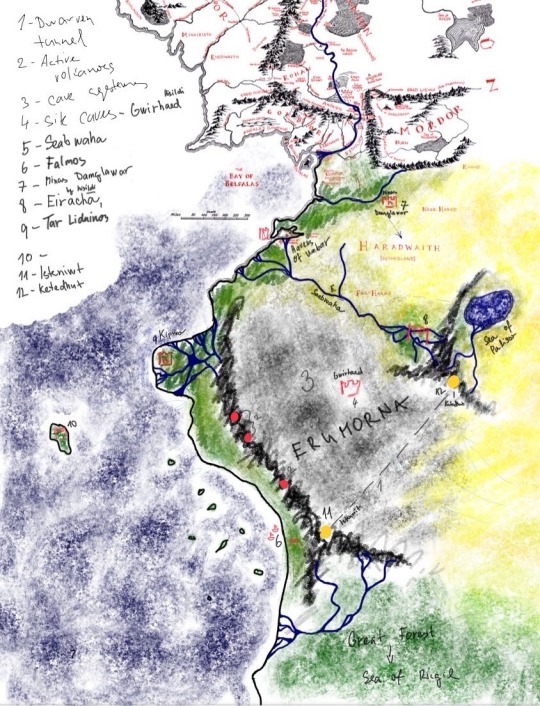
Here is the map for my story "Etude of Singing Sands", which will be a part of the larger series "Lament for the Fallen." Although this map is most useful for EoSS.
The coastal cities are named in quenya because of the Black Numenorean influence in these lands. Havens of Umbar were taken by Herumor and Fuinur took over Kipura and named it Tar Liduinos. There are of course many more human settlements across the coast, but I did not named them as they are mostly small cities and villages. The coast is rocky and it is quite hard to grow any crops which would support a large population. So people of these lands are mostly fishermen and traders, transporting goods by sea from South. I suppose there should be a large kingdom at the riverbank, but I still need to think about that for sure.
The native people of coastal lands were killed, enslaved or ran to the desert with the coming of Black Numenoreans. I suppose they took man of their women as unwilling wives too.
The people of desert are divided to two categories – these who lived there as default and these who escaped the invasion. The divide is quite important because these two groups do not like each other much. There are not many resourcas in desert and when the men of the coast ran, they also invaded the desert dwellings. It had been thousands of years of course and many tribes merged with each other, but the two groups are still quite distinct. The people of sea who call themselves Yawith regards Kipura and Achniwt (Umbar) as nearly legendary heavenly place of their origin. Before the War of the Ring begins, Sauron's lieutenants promise them these lands in exchange for military help. These people do not see any difference between Gondorians and the Black Numenorean usurpers and so they fight for Sauron.
One of the smaller coastal city states is Falmos, a merchant city, they specialise in trade with dwarves of Isteniwt who are mining diamonds, but they also bring other goods from South as well. As I said Isteniwt is one of the two dwarven cities, the other being Ketedhut at the oase of Palisor. The dwarves of Isteniwt are mainly jewelsmiths and jewellers, mining precious stones and gold. The mountains at Palisor are rich in iron and so Ketedhut make swords, shields and also items of ordinary use, but they are great at enchantment and also mine salt. Ketedhut has good relationship with Gwirhaed, but the ties with Eiracha went sour. From Gwirhaed they export their spider silks through Isteniwt and Falmos. These two cities are connected by a tunnel as you can see. The tunnel is not entirelly artificial. The black desert of Erumorna was formed by volcanic action and there still is active volcano, although two more were awakened during the War of the Ring. These volcanoes formed many caves under the desert and these run very deep and were even more deepened by dwarvish explorations. Dwarves mapped Erumorna very well and they are great friends of the desert's maia of the same name.
There is probably mannish kingdom at the sea of Palisor for sure, but let's talk about Eiracha. Eiracha is a city of many stairs, it's heart floats on a great underground lake and there the palace was build. The caves are filled with the dwellings of Hisildi who are one of the Kinn-lai. There are many hot springs and it is said by some that it's waters are holy and mortal flesh could not touch them for they would boil in the water, on the other hand men believe that those who drink the water gain eternal youth and some even said that bathing in some river will make them untouchable. Eirachini do not sell the water and it can only be given as a gift.
What I know about the people of the sea of Palisor is that they used to be friends of Eirachini, but over time grew more bitter and ultimatelly stood with Ketedhut (which was also much more important for them due to trade) in the conflict and so their ties were severed. Palisor is kind of lonely and less open to visitors than Gwirhaed. Any information regarding Gwirhaed would be probably spoiler so I'll say neigh of it!
Saebwaha is offiicially under the rule of Umbar (Achniwt) but there are many factions and semi-autonomous city states which constantly fight for their rights and lands, they would very much like to free themselves of umbarian rule. The lands of Near Harad are also sparsely populated by smaller colonies, mostly farmers and herders, they breed horses which are rare comodity in South as they are not very suited for caves nor living in the searing hot desert and only the rich can transport and care for horses in Tar Liduinos, Falmos and other smaller merchant cities where horses are a symbol of wealth and the families are very proud of their steeds lineages. Sadly the populations of these horses were decimated during the War of the Ring and only few remained preserved by the people who refused to ally with Sauron and drove their herds away to the desert where only few of the people and horses survived.
What I omissed are the goats. Goats are very important animals, they are not native to Erumorna but over ages they assimilated. These goats live in caves and mostly eat mushrooms and lichens which they lick with their long tongies of the rocks and crevices, they of course also graze on mosses and epiphytes which may grow in some caves. As you can imagine these goats spend most of their life licking stones. They have very big ears aiding them in thermoregulation. Otherwise the cave goats are quite small and lanky, since the caves are still active and eruptions of gases may occur as well as earthquakes and gas capsules, they are very sensitive to these things and excellent predictors. Their navigation ability is also superior to all creatureš
However the dwarves of Isteniwt crossed the desert goats with more studry mountain breeds and created the royal goat line. These dwarven goats are taller and more sturdy with elegant long bodies and legs they resemble more a gazelle. They can drive a cart or carry some supplies for their are strong in despite of their delicate appearance. The royal goats are very proud and opinionated too and may refuse to be sold or given away, their trust must be earned.
I am still not sure how to name the island or who lives there..
#map of harad#wip#just early draft#possible minor changes may happen!#tolkien#lord of the rings#lotr#crossover#my work#eoss#lament for the fallen#far harad#near harad#headcanon
12 notes
·
View notes
Text
Repercussions
“Everybody, calm down, quiet down. I’m sure there is a perfectly reasonable explanation for this.” Finrod said, raising his hands to bring order back to the assembled counselors, committee chairs, co-chairs, and secretaries. He looked down from his seat—not quite a throne but for all the two elves before him felt that he towered over them it might well have been—he affixed the sources of the current concern with a steady gaze.
“Please,” He said. “Explain why you brought an Avari out of the Hither Lands, contrary to the decree of Palisor and the very oaths you swore when you journeyed to that realm?”
Gil-galad thought that was going a little far. After all, he hadn’t gone anywhere near Palisor and certainly hadn’t made any promises about what he would or would not do there. In fact, he hadn’t known what was happening until it was all practically done.
Elrond swallowed beside him, clearing his throat.
“Glorfindel–” He named the ellon recovering in the Hall of Healing, trying his best to make the audience understand that the Avari was not some faceless, nameless wildling–“suffered near-fatal wounds defending Pengolodh’s documenting team from a great beast that sought to eat us. Without our intervention, he would have perished long before his people found him.”
“Intervening is exactly what you swore not to do.” Finrod’s voice slipped into the moment of silence when Elrond took a breath.
Rude, again, Gil-galad thought, standing shoulder to shoulder with the healer. Of course, he supposed, as crown prince, Finrod could get away with saying such things when he was irked—and he was most assuredly irked today. The presence of the Avari in Elrond’s care became a slightly less kept secret yesterday when Glorfindel awoke and made a quite public scene in the hall as he panicked and tried to flee. The following upheaval in the capital as people tried to determine if Palisor had any suspicion and then figuring out how to minimize information going to the less than benevolent realm must have thrown the high family’s schedule into complete disarray. Perhaps Finrod usually went to the bathhouse around this time. Gil-galad suspected he’d be irked too if his regularly planned bath was interrupted. Completely understandable.
Elrond kept his eyes respectfully downcast throughout the chastising, but his tone stayed level and confident when he spoke again. “Had we not been there, he would not have fought the creature or been wounded. Leaving him to die would not have changed that and was no way to repay him.”
Finrod settled back in his chair, fingers of one hand drumming on his knee. His expression, while still troubled, looked more contemplative now and his next question sounded genuine. “And what do you intend to do with him now? He cannot stay in the halls indefinitely.”
Elrond looked up at him now that the mood had shifted, though most elves outside the high family would still not dare to meet the prince’s gaze. Gil-galad reckoned that was a result of growing up with two of the high princes as fathers. “Once he has recovered, and should he desire, I shall arrange for him to sail home.”
Finrod blinked slowly. “Ereinion,” He said suddenly.
Gil-galad almost jumped in surprise at finally being addressed. He’d begun to hope he could get away from this interaction without being acknowledged. Alas. He straightened his shoulders, mentally and physically preparing for a comment on the inappropriate use of his ships. Could he lose the fleet because of thes? Círdan would be so disappointed. “Yes, my lord?”
“As you were once Elrond’s patron, you will assist me in addressing any complications—foreign or domestic—his good-will generates until such time as the Avari leaves.”
“Of course, my lord. I am your humble servant.” Gil-galad said, inwardly groaning. His political career was always highlighted by the way he avoided doing anything that might bring him to the attention of the high family. Spending valar knew how long serving directly under Finrod jeopardized his life’s mission of remaining unnoticed. He and Elrond would have strong words after this. Or words, at least. Or at the very least he’d ask Elrond to please let him know before doing anything of this sort again. Okay, he’d likely just kiss him (but he’d mean to have words).
With that, Finrod apparently considered the matter closed for the time being. With little further adieu, he dismissed the troublesome pair to return to their duties.
#does this count at illegal elf trafficking?#elrond insists he's done nothing wrong. ever#gil-galad says he's not guilty on the grounds that 'i love him. your honor'#wild avari glorfindel tried to escape but he was still rather disoriented and wounded so he didn't get that far#he tried though#almost gave elrond a heart attack (he's half human so he can get those)#i love writing from gil's pov because he has a lot of opinions#elrond#gil galad#elrond x gil galad#finrod#glorfindel#the silmarillion#silm abo au#grimwing writes
17 notes
·
View notes
Photo



men of middle-earth ϟ the first men ϟ headcanon disclaimer
The first Men were Unbegotten as were the elves, and as the Firstborn woke beneath the stars, so did the Secondborn awake with the first rising of the Sun. Even as plants and animals woke from the Sleep of Yavanna, the first Men opened their eyes and wondered at the light above them, rejoicing in their gift of life and the discovery of the world around them. But before even this awakening there were two Men who knew Arda under the cloak of Darkness, for the elf Nuin of the Hwenti was a curious wanderer who stumbled upon Murmenalda, the Vale of Sleep, where the forms of Mankind awaited the first Sunrise. Nuin wondered greatly at this sight, deep in the mountains of Hildórien in the land of Palisor, and watched over the sleeping figures for long stretches of time. Eventually Nuin’s curiosity overwhelmed them, and when they stumbled against one of the Sleepers, causing the Man to stir, they could wait no longer. Nuin woke two Sleepers, a man and a woman, and though they had yet no speech and no understanding, they saw Nuin as a friend from the beginning. Nuin gave them the names Ermon and Elmir and taught them a little of the speech of the Hwenti, and it was not long before the Sun rose at last and the other Men awoke around the first two. Nuin remained in dear friendship with the first Men, especially Ermon and Elmir, and though they were eventually slain by the treachery of the Úmaia Túvon, the Men of the East held them in legend forever after, and the Edain remembered the kindness of Nuin when they first encountered the Eldar in Beleriand.
#tolkienedit#oneringnet#silm#silmarillion#book of lost tales#bolt#murmenalda#hildorien#palisor#nuin#ermon#elmir#ermon and elmir#my edit#my writing#edit writing#headcanons#tefain nin#men of middle earth#the first men#love that im doing The First Men as.....the Last edit in this part of the series lmao
33 notes
·
View notes
Photo

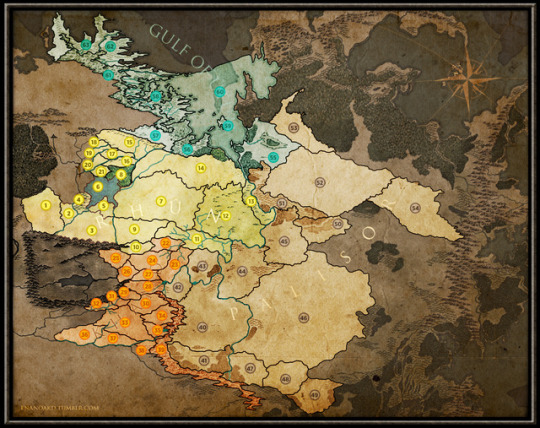
Note: This map shows the regions inhabited by tribes descended from the Talatherim tribes of the First Age. In the Third Age, these lands were known under the name Rhûn, Khand, Palisor, and Gulf of Ûtum. All these regions are part of the great plateau of Central Middle-Earth. The names and their geography of this regions were developed by Iron Crown Enterprises for MERP and Loremaster, therefore, they are not part of the canon of the Tolkien Legendarium.
Who were the Talatherim?
The Talathaerim (Av. "Plains-people", S. "Talathrim") or simply Talath were a primitive Easterling-culture of the First Age. They were nomads from Hildorien who wandered throughout Palisor and became the indigenious population of the vast steppe-lands of Central Middle-earth. The Talatherim were not a unified people but a collection of many different peoples. Most were herders, often swarthy, relatively small and stocky and close relatives to the Bórians and Uldorians of Beleriand, though one of their groups, the Tyr, were noticed for being exceptionally tall and fair-haired and were often guessed to be lost eastern relatives of the Hadorians.

Near-Rhûn (S. "East") was a vast region of nearly 500,000 square miles. Most of it is open territory - covered grasslands of varying quality. Western Rhûn was dominated by mountains, rolling hills, and river vales near the Inland Sea of Rhûn (S. "Rhûnaer"). Numerous rivers - including (clockwise from the northwest) the Celduin, Kug, Sûrûbeki, and Warwater - fed this great sea, which was the largest inland body of water in all of Middle-earth. The Taur Rómen (S. "Eastern Forest") covered the entire Kug Valley. Nearly 200 miles across, it stretched over 100 miles northeast of the Nen Rhúnen.
Near-Rhûn was home to myriad peoples. Ulgathig-speaking tribes typically occupied over half the area, including the eastern and central reaches. Ioradja-speakers usually dominated the southern steppe-lands. A mix of groups, of which the Dorwinrim were predominate, lived along the northern and western shores of the Inland Sea.
Click on the names of the regions for more information:






















Khand (earlier "Kha-on") stretched between the southeastern flank of the Ephel Duath and the northwestern edge of the Ered Harmal. It occupied the semi-arid plateau bordering northeastern Harad and thus commanded the great Khand Gap, the 100-mile wide pass facing southern Rhûn and eastern Mordor. Nûrad lay in the hills to the northeast.
Hot, dry, and windy, Khand was an unforgiving locale. Its flat, lowland areas afforded few means for stable settlement. Scrub and desert abound throughout Lower Khand. Here, horse herders moved their lightly-encumbered bands around a circuit of periodic shelters and encampments, their routes dictated by the location of springs, seasonal pools, and intermittent streams. The only permanent settlements lay along the broad, shallow Knife River, a tributary of the Harnen.
Upper Khand, which comprised the eastern and northern quarters of the region, enjoyed a bit more rainfall and cooler temperatures. The more numerous tribes of the area were generally richer and more settled than their brethren to the west and south.
Click on the names of the regions for more information:



















Palisor (Primitive Quenya: "Flat Land") or The Great Plain was an ancient term for the vast Lands of central Middle-Earth. Palisor encompassed the far Lands between the Great Greenwood in the west and the Orocarni in the east and included the vast Inland Sea of Helcar, the Mountains of the Wind with the Land Hildorien and the Murmenalda and the Lands of Cuivienen.
In the second and third Age most knowledge about eastern Middle-earth was lost and when Gondor conquered the lands surrounding the Rhûnaer they were astonished by the beauty of the Sea of Flowers in the east, why they called the unknown lands east of the Rhûnaer Menelothriand.
Palisor was believed to have been the birthplace of Elves and Men (and probably Hobbits) and the place of the Awakening of the four eastern Dwarf-Tribes. It was still inhabited by the various Easterling peoples, Orcs, Trolls and scattered remnants of Dwarves, Avari and Giants.
Click on the names of the regions for more information:
















The Bay of Ûtum (or Bay of Utumno) was a hughe rift in the Far North of Middle-Earth which separated the Forodwaith of Mur Fostisyr from the great Northern Peninsula. It was created by the destruction of Utumno by the Valar.
Most of the Tyr Easterlings settled around the shores and plains surrounding this bay. Among all descendants of the Talath the Tyr were often noted for having fair hair and pale complexion, perhaps hinting towards a long forgotten relation to the Hadorians.
Click on the names of the regions for more information:









#my edits#tolkienedit#lotredit#Rhûn#Easterlings#Central Middle Earth#Palisor#Gulf of Ûtum#Khand#Talatherim#Wainriders#Balchoth#MERP#lord of the rings#lotr#the hobbit#silmarillion#haradrim#harad#sauron#mordor#Hildorien#Sea of Rhun#Variags#middle-earth#Loremaster#Tolkien#Rhun#Rhovanion#Gondor
129 notes
·
View notes
Text
I Venë Kemen
(The Great Ship of Arda)
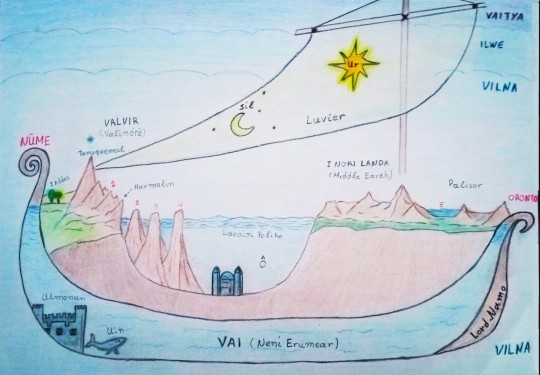
Nūme: West.
Oronto: East.
Valnir: Valinor (Valinórë).
I Nori Landa: The Great Lands (Middle Earth).
Layers of air
Vaitya: (or Vaita) the Walls of Night (Darkness, void ).
Ilwë: (or Silma or Ilma) The region above the sky. The air, than which it is thinner and more clear. Here only the stars and the Moon and the Sun can fly.
Vilna: [Vilnius=lower air] (or Wool or Vista) Aiwenórë (The land of birds). Wherein birds may fly and air clouds sail.
Sil: the Moon.
Ûr: the Sun.
Luvier: Clouds.
I Aldas: the two trees of Valinor.
Taniquetil: (or Oiolossë) The highest of the mountains of Pelóri and the tallest peak in Arda. On Oiolossë were the halls of Manwë and Varda.
1. Toros valinoriva: The Pelóri were the mountain-fence of Aman.
Harmalin: (later Arvalin) or Araman. The northern coastland of Aman, north of Valinor, that lay outside the mountain-fence of the Pelóri. It was deserted, mountainous and frozen because of its neighbouring with Helcaraxë.
2. Tolli Kimpelear : (likely referring to the Twilit Isles/ Twilight Islands).
On Tolli Kimpelear was The Tower of Pearl .
3. Tol Eressëa: A large island off the coast of Eldamar. Its name translates from Quenya as the Lonely Island.
4. I Tolli Kuruvar: Enchanted Islands (The Magic Isles).
Haloisi Velike: or Belegaer, or the Great Sea, or the Sundering Seas, or the Western Sea. Was the sea of Arda that was west of Middle-earth.
Ô: The Sea. The halls of Ossë.
5. Koivienéni: Cuiviénen.
Palisor : In Palisor lay the Waters of Awakening, where the Elves awoke.
Ulmonan : The halls of Ulmo. Located in the bottom of the outer water.
Uin: The Great Whale. Servant of Ulmo.
Vai: (or Neni Erúmear) The Outermost Waters.
[Neni= wet
Erú
Mëar=gore]
#I Vene Kemen#Arda#the great ship of Arda#middle earth#valinor#tolkien#jrr tolkien#Námo (Mándos) Fëantúri
91 notes
·
View notes
Text
The Tale of Tinuviel
The Tale of Tinuviel starts with linguistic discussions, as usual :) And with the story of Tinwelint (Thingol) and Gwendeling (Melian), which is pretty much as we know it from The Silm: Tinwelint gets lost on his journey from Palisor, falls under Gwendeling’s spell, then they build their kingdom, have a daughter Tinuviel, who dances in the woods, gets spotted by Beren, kinda starts liking his attention...
Arwen and her ancestors: seducing innocent elves/men in forests since the Great Journey from Palisor (Cuivienen) :D
* * *
I love that Tinwelint’s place (Artanor) is described a bit like a wild and unpredictable fearie court:
(…) many a wild and woodland clan rallied beneath King Tinwelint. Of those the most were Ilkorindi – which is to say Eldar who never had beheld Valinor and the Two Trees or dwelt in Kor – and eerie they were and strange beings, knowing little of light or loveliness or musics save it be dark songs and chantings of a rugged wonder that faded in the wooded places or echoed in deep caves. Different indeed did they become when the Sun arose, and indeed before that already were their numbers mingled with a many wandering Gnomes, and wayward sprites too there were of Lorien’s host that dwelt in the courts of Tinwelint, being followers of Gwendeling, and these were not the kindreds of the Eldalie.
* * *
Okay, so Tinuviel had a brother, Dairon (sounds familiar :)), who was one of the most skilled Elvish musicians. He played musical instruments, and she danced.
Beren was a Gnome (which may or may not have been even worse than being a man at that time, because, fear and politics...)
* * *
Tinwelint's first meeting with Beren went just like in The Silm:
“O Beren son of the Noldoli, what dost thou desire of the Elves of the wood ere thou returnest whence thou camest?”
translation: what can I do to make you go
And then a classic:
Tinwelint: you want to wed my daughter? Sure, just do a small thing for me - bring me the silmaril from Melko’s crown
Beren: watch me
#LegendsOnly
* * *
Beren... hadn't really thought this endevour through, though... Eventually he got caught by the Orcs and was brought before Melko; but then he survived by flattering his way through exactly like Fan Xian in Northern Qi lying through his teeth about wanting to marry the Saintess :D
Now the Valar must have inspired that speech, or perchance it was a spell of cunning words cast on him in compassion by Gwendeling, for indeed it saved his life, and Melko marking his hardy frame believed him, and was willing to accept him as a thrall of his kitchens.
Enter Tevildo, the Prince of Cats! Who has his own palace, in which Beren is now supposed to work:
(...) those halls were ill-lighted and were full of growling and of monstrous purrings in the dark.
(I don't think Tolkien liked cats...)
Anyway - it's like this:
A cat. Employs a human. To catch mice in his palace. But the human sucks at this, so he gets relegated to washing the dishes and such.
#what :D
* * *
Meanwhile, in Artanor:
Dairon is a snitch, Tinwelint learns about Tinuviel's plans to go after Beren, so he imprisons her in a luxurious tower. Surprisingly, it works for a while, but then Tinuviel misses Beren again, and magics her way out of the tower (I love the descriptions of her weaving her spells!)
After Tinuviel finally escaped, Dairon went looking for her and never came back.
#what
#WhyIsThisSoDark
I also love that some time after her escape Tinuviel actually had a moment of “what am I doing???”
Same, girl. Same :)
* * *
Okay, so, there are like gang wars between the Cats, led by Tevildo, and the Dogs, led by Huan. Fortunately, Tinuviel met Huan on her way, Huan turned out to be friends with Beren, so together they laid a trap for Tevildo, and everything played out as if it was a Diana Wynne Jones story :D (yes I know she was JRRT's student)
Seriously, this story has such fairy-tale vibes, I love it ^^
Melko's reaction to Tevildo being defeated by Huan:
(...) afterward Melko heard all and he cursed Tevildo and his folk and banished them, nor have they since that day had lord or master or friend, and their voices wail and screech for their hearts are very lonely and bitter and full of loss, yet there is only darkness therein and no kindliness.
(I don't think Tolkien liked cats: exhibit no.2)
* * *
Now, onto the silmaril theft!
This time it was a well-thought plan (kind of).
Beren impersonated a cat. Tinuviel danced and sang everyone to sleep, incuding Melko. It is implied she could make LORIEN sleep.
#what
Then Beren used a stolen KITCHEN KNIFE to pry the silmaril out of Melko's crown. Yep, it went just as well as it sounds. In the end Beren's hand (with the silmaril) ended up inside the biggest baddiest wolf's stomach.
Beren and Tinuviel managed to escape into the woods and just... lived there, until they learnt of the unforeseen CONSEQUENCES of their deeds:
(...) the king had been distraught with grief and had relaxed his ancient wariness and cunning; indeed his warriors had been sent hither and thither deep into the unwholesome woods searching for that maiden, and many had been slain or lost for ever, and war there was with Melko's servants about all their northern and eastern borders (...)
"(...) for long has the Queen Gwendelig sat aloof and smiled not nor spoken, looking as it were to a great distance with haggard eyes, and the web of her magic has blown thin about the woods, and the woods are dreary, for Dairon comes not back(...)"
"(...) there has broken upon us raging from the halls of Evil a great grey wolf filled with an evil spirit, and he fares as though lashed by some hidden madness, and none are safe."
yeah...
So Beren and Tinuviel go back to Artanor, make peace with Tinwelint, a hunt for the wolf is organized, the silmaril is regained, the wolf slain, but in the process Beren sacrifices his life for Tinwelint. They bring him back to Artanor and Tinuviel has like 5 minutes to say goodbye to him. THE END
#WHAT
#ATrueC-dramaEnding
Then the storytellers go into headcanons/fan fiction teritory :D There are two versions of what happened later (a fix-it and an angsty fix-it):
- Tinuviel’s magic kiss healed Beren and they lived happily ever after, or
- Tinuviel died of grief not long after Beren did, and then the two of them got reincarnated as mortals because Mandos took pity on them.
* * *
So that's the story! The core is always the same as in the later versions, so it's all about the details :) I really liked this fairy-tale-esque early take, with its dark elements (like Tinwelint and Gwendelig losing not only their daughter, but also their son at the same time...).
1 note
·
View note
Text
tolkien fans/anyone who's read beren and lúthien (not the chapter in the silmarillion, but the book edited by christopher tolkien): please, i need help with pronouncing the following terms:
Tevildo
Tinwelint
Palisor
Artanor
Gwendeling
Unhweliantë
Egnor bo-Rimion
Guilin
Umuiyan
Oikeroi
Miaulë
Ermabwed
Elmavoitë
Nan Dumgorthin
i-Cuilwarthon
Angainu
Ausir
#leah's readings#leah reads beren and luthien#beren and luthien#beren and lúthien#tolkien#the silmarillion
2 notes
·
View notes
Text
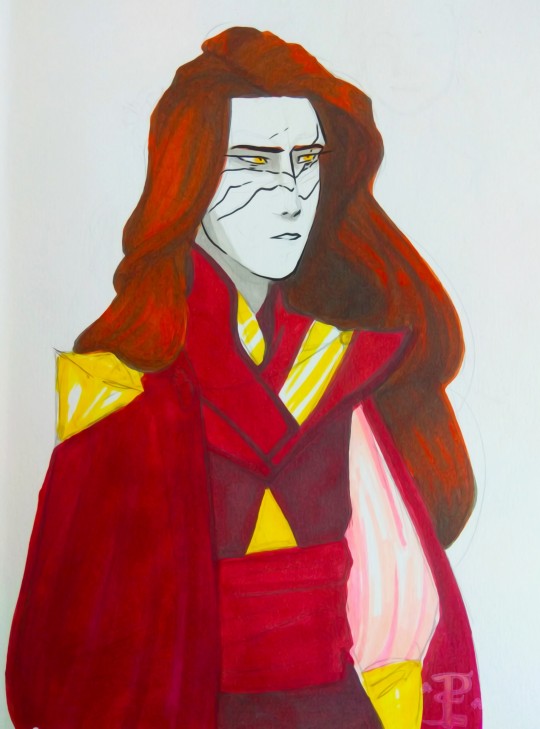
Y'all remember Fankil? That one guy who has Lieutenant issues @ Sauron for taking his place? The one who started the Battle of Palisor? That guy who some think was THE Dark Hunter?
You probably don't but I love this Mairon wannabe fucker so now he has a design
#Fankil#Tolkien's underrated villains#I'm making this into a series#Langon and Lungorthin are next#I'm also making a designs series for avar elves we know#I'm gay af for Queen Dardarien#mitzy's art#the silmarillion#lotr#lord of the rings#tolkien
18 notes
·
View notes
Photo
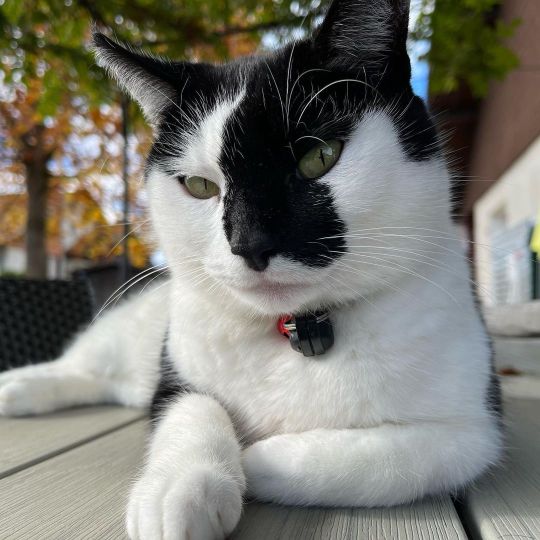
Thémis < Thû >Tevildo, également connu sous le nom de "Prince des chats", était considéré comme le plus puissant de tous les chats "et possédé par un esprit maléfique, comme certains le disent"[1]:15-16 selon la première version du légendaire du Livre des contes perdus. Fankil, également connu sous les noms de Fangli et Fúkil au début de la rédaction, était un serviteur de Melko, et n'apparaissait que dans les premières ébauches du récit du Gilfanon. Il faisait office de lieutenant du Seigneur des Ténèbres[1], un rôle qui sera tenu par Sauron dans la version finale du Silmarillion. Fankil est mentionné pour la première fois dans une note concernant le Réveil des Elfes comme s'étant échappé dans le monde avec les autres formes sombres lorsque les Valar ont brisé Utumna[2]. Il est ensuite venu vivre parmi les Premiers Hommes, vraisemblablement à Palisor. Avec ses Nains [note 1] et ses gobelins, il se mêla aux Hommes afin de les éloigner des Elfes et certains rejoignirent les Nains maléfiques. Il en résulta la bataille de Palisor, la première guerre entre les Elfes et les gobelins. Dans une esquisse antérieure, Fangli et ses Nains maléfiques, ont conquis Palisor. Les Hommes corrompus par lui devinrent des peuples sauvages, vénérant Melko. https://www.instagram.com/p/CjvFYrpNcM0/?igshid=NGJjMDIxMWI=
0 notes
Text
Tolkien’s Rejected Villains
For Day 5 of Silmweek, I haven’t got enough time for a full meta, so I thought that I’d talk about some fun evil minions from the weird early versions of the Legendarium. Some of these are quite interesting figures, so I thought that fanfiction writers especially might be interested in rescuing them from the scrap heap, and polishing up some new background characters they don’t have to name. Remember that the early drafts are kind of crazy sometimes and often aren’t canonical to Tolkien’s later writings. It’s pretty great.
Lungorthin was a balrog and Melkor’s Master of the Guard. He spent most of his time in Angband’s throne room, guarding his master. Why does a Vala need to be guarded by a less powerful being? Paranoia I guess. Lungorthin’s claim to fame is that he burns with white flames, rather than red ones like regular Balrogs. Since white flames are hotter than red ones, Lungorthin seems like an extra special kind of evil you should definitely avoid.
Langon was the herald of Melkor who was sent to negotiate with the Valar when they besieged Utumno in the Book of Lost Tales. Probably had a great voice.
Fankil - a proto-Sauron figure from the early outlines, he was Melkor’s lieutenant and the leader of dark armies in the East (Palisor). After Melkor was imprisoned, Fankil started corrupting the first Men with his Dwarves (who were evil at the time) and goblins, turning them against the elves, and starting the first war between Elves and goblins. In an even earlier version, he and his evil dwarves conquered Palisor.
Fluithin or Ulbandi the Ogress. What’s an Ogre? In the early drafts, a race of cannibal giants. In later versions they don’t appear except in tales, and were probably either a mythological race, or possibly another name for trolls. I prefer to think of ogres as prototype trolls myself. Fluithin is from the earliest drafts, which were pretty weird, and in that version the Ainur had children and behaved more like pagan gods. Fluithin had a child with Morgoth, and that is literally all we know about her.
Kosomot/Kalimbo - the earliest version of Gothmog the Balrog, where he was the giant ogre son of Morgoth and Fluithin the Ogress and wasn’t on fire.
Tevildo, Prince of Cats. Certified children’s book villain. A great black cat with a collar of gold who ruled a castle full of giant cats. What did Tolkien have against cats anyway? Beren is sent to Tevildo when he’s captured by Melkor, and Huan and Tinúviel defeat Tevildo, free Beren, cast down his castle and turn all his cats regular size. Several rewrites later, Tevildo eventually becomes Sauron. Yes. Sauron was originally a giant magic cat.
#Tolkien#Silmarillion#silmweek#canon#text post#Servants of Shadow#Before First Age#First Age#my writing
1K notes
·
View notes
Photo






men of middle-earth ⧎ easterlings and southrons ⧎ headcanon disclaimer
When the Race of Men first Awoke in Hildórien upon the rising of the Sun, they soon divided into several distinct groups. Many traveled westward, while others moved to the South, but some stayed in these eastern regions, calling their birthplace the Land of the Sun. Untouched by Valarin influence, these eastern peoples’ first contact with the Powers was when Túvon, an emissary of Melkor, swayed them to the service of his Master. At first Túvon seemed a generous lord, but when Melkor revealed himself in his full might, it became clear that the Dark Vala had cast his shadow upon the East, claiming it for his own, and his influence upon the Men of the Land of the Sun would linger through many Ages. Yet Melkor’s corruption was incomplete, and Men were ever prone to follow their own desires and be masters of their own will. Some, troubled by the conflict the Dark King stirred up in their homelands, embarked upon journeys to the West, seeking their kin who had gone before and lands free of Túvon and Melkor’s control. Though they were not to find the latter, these tribes led by Kulren and Pegmûl would make their way to Beleriand, and become entangled in the histories of that land. After Melkor’s defeat, for awhile the Men of the East were free of his oppressive darkness, but after a scant few centuries his surviving servants returned to their lands. Túvon established himself as a sorcerer upon the mount of Kalormë, the hill-crest over which the Sun rises, and ruled over the Sûhalar people in Mountains of the Wind, while his rival Thû conquered the region of Palisor and declared himself a God-King and the successor of Melkor. He manipulated the Men of Palisor, turning the horse-riding Khundolar tribe against their close kin the Chayasír, and built himself a castle in Khundoland from which he would rule. As Thû’s influence spread, he commanded many towns and walls of stone to be built, and supplied his Mannish subjects with weapons of iron, amassing an army and turning their hearts against the men of the North and West. He first turned his might against Túvon’s stronghold in the Walls of the Sun, hewing down mountains and laying siege upon his former fellow-servant of Melkor. After a long and bitter war, Túvon at last surrendered, and Thû made him his thane. With his enemy turned to his service, Thû took his leave of the Land of the Sun for some time, departing into the Westlands with orders for his armies to prepare for another war. When Thû returned some centuries later, he carried with him many Rings of Power, which he granted to the chiefest of his mortal servants: Khamûl, the regent of Khundolar, and Kullund, the pirate-queen of the Inland Sea. With these Rings they became fierce and powerful magicians, instilling terror upon their subjects and bending them ever to Thû’s will. These first of the Nazgûl led their Master’s armies against Eregion alongside orc-armies that poured forth from Mordor, and though eventually they were driven out of the Westlands, Thû kindled within the his eastern servants a hunger for the fertile lands west of the Sea. When besieged by the elves and Men of the West, Thû called upon his eastern armies to support him against the Last Alliance of his foes. Yet despite the valour of the Men of the East, Thû fell in battle and was lost, his Nazgûl lords fleeing. His defeated servants returned to the Land of the Sun, released from Thû’s tyranny, and slowly began to rebuild their lives. Túvon retreated back into his stronghold upon Kalormë, letting the tribes of Men do as they pleased, which was often engaging in battle against one another, or to harry the Dúnedain of Gondor. But Thû was not utterly defeated. His spirit, though much diminished, slowly pieced itself back together, and soon whispers were heard in the streets of Khundoland that the King of the Dark Castle stirred again. Thû’s influence was much subtler this time, and he whispered into the ears of Men rumors of Gondor’s wealth and the wildness of the Northmen, unjustly lording over lands they did not deserve. Thus the Men of the East were kindled to war, harassing Rhovanion and Eryn Galen all the way down to the Vales of Anduin, until they were driven out by the Northmen and Rómendacil II of Gondor, forced back to the Inland Sea of Tavukhor. Yet it was not long before Thû’s mightiest servants returned to him: Khamûl and Kullund, now only wraiths, marshalled their ancestral kindred into a confederation of Wainriders, leading them in a second conquest of Rhovanion and enslaving the Northmen. Their enemies had been devastated by a Great Plague, and proved easy to defeat, and even when King Calimehtar of Gondor gathered enough strength to strike back against them he was unable to reclaim the fullness of his former territory. Now Thû moved to ally the wagon-riding Easterlings with his vassals to the south. Under his guidance, the Wainriders conspired with the Variags of Khand and the Hasharin of Abrakhân to lead a two-pronged attack against Gondor, while Khamûl and Kullund’s superior the Witch-King of Angmar harassed Arnor in the north. Though ultimately the Wainriders were defeated, slaughtered by Eärnil II in the Battle of the Camp, their campaign brought an end to the royal line of Gondor, and would weaken their Master’s enemies irreparably. Thû moved the Witch-King to Minas Morgul, while Khamûl was relocated from Khundoland to Dol Guldur, where Thû had dwelt in the guise of a Necromancer in order to spread his Shadow throughout the forest now known as Mirkwood. With Arnor destroyed and Gondor dealt a heavy blow, Thû bided his time before making his next move. For some years, he allowed the Men of the East to recover, trading and farming and rebuilding their populations, but eventually he stirred them up once more into a second confederacy of Wainriders. When these folk, composed primarily of the Khundolar tribe with some soldiers of Jangovar descent, rode south to battle, their Gondorian foes named them the Balchoth, the “horrible horde,” and were shocked by the presence of many women among their troops. Allied with orcs, the Balchoth overran the fair plains of Calenardhon and were near to conquering the rest of Gondor, who were distracted by attacks by the Corsairs of Umbar in the South and could not mount a full defense. But just when victory seemed nigh, Éorl of the Éothéod rode to the rescue of Steward Círion, winning the Battle of the Fields of Celebrant and driving the Balchoth away. Yet some Easterlings lingered in the land, assaulting the newly formed Kingdom of Rohan and slaying Éorl in the Wold, their bloody conflicts providing a distraction that allowed Thû to reclaim the land of Mordor unnoticed. In the War of the Ring, Thû sent his Nazgûl to muster an army of every tribe of Easterling to attack his enemies in this his final campaign. Khamûl emerged from Dol Guldur and drew all his folk of the Khundolar onto their horses and wagons; Kullund arose from the depths of Tavukhor and rallied her people, the seafaring Jangovar, to battle against the kingdoms of Dale and Erebor; Túvon was dragged out of his stronghold by the threat of Thû’s growing power, and led the stout, dwarf-like Sûhalar tribe who dwelt in his mountains to battle with their axes and cannons. Only the Chayasír refused Thû’s call to war, for which they would pay dearly in time. At the Battle of the Pelennor Fields, the Sûhalar and Khundolar fought alongside the orcs and trolls, the Variags of Khand, and the Haradrim warriors of Yettafaz, Rûvashû, Abrakhân, and Sud Sicanna. They laid siege to Minas Tirith, and it took the combined might of all the Free-peoples of the West to drive them back to Mordor, where Thû gathered his armies and prepared for a final assault to pour forth from the Black Gate. Yet the Men of the West brought the fight to him, marching to Morannon with a challenge, and once more the Easterling armies fought against their Western kin. But this battle did not last long: near as soon as it began, it ended, for Thû’s tower fell and the land of Mordor crumbled beneath their feet as his power was ended in Middle-earth at long last, his Ring melted down in the fires of its making. The Men of the East and South fled, and in time were subdued by King Elessar of the Reunited Kingdom and King Éomer of Rohan, forced to pay tribute to the West until they could prove they would no longer harm their kingdoms. With Thû utterly defeated, never to rise again, the Men of the Land of the Sun were at last free of the Shadow that had hung over them nearly since their first Awakening. The Khundolar, Jangovar, and Sûhalar returned to their homelands much-diminished, reorganizing their settlements and governments and eventually finding a balance between the Three Tribes that allowed them to live in peace. But for the Chayasír, who alone had defied Thû’s might, their trials were just beginning. These folk, craftsmen and tradesmen who had no love for Thû and took no part in his War, were driven out from their homelands when their vengeful Master perished. On the very same day the One Ring was destroyed, Thû’s darkest designs were at last unravelled: their crops withered before their eyes, the corpses of their dead rose from their graves, and the earth shook beneath their feat. With his last breath, Thû had cursed his faithless followers, and the remnants of his Shadow seeped out of their lands as a living curse. The Chayasír fled the destruction and disease of their homeland, turning first to Túvon and the Sûhalar in the Mountains of the Wind for aid, but the Sûhalar remembered their betrayal and refused them succor. Túvon may perhaps have wished for more mortal servants, but he was much diminished from his part in the War, and had not the strength to overrule the chieftains of the Sûhalar, who had long ago bargained with him for an equal role in their governance. Thus the Chayasír embarked upon the long march into the West, the winds they once had loved turned sickly and sour at their backs. When at last they reached civilization, they were met with hostility from the dwarves of the Iron Hills and the Men of Dale, who had only just won a bloody war against the Jangovar of Tavukhor. The Chayasír did not hold themselves in kinship with the Jangovar, and even their ancestral ties to the Khundolar had long since been severed, but the northerners did not distinguish between the two Easterling clans and were openly hostile to the refugees. As the Fourth Age began and the Three Tribes of the Sun worked to rebuild their civilizations in a world without Thû’s tyranny, the Chayasír strove to integrate themselves into the society of the North. It would take the intervention of King Elessar to allow them to settle in the wilderlands once desolated by the dragon Smaug, and their existence would be hard and bitter for generations, but eventually the Sun their mother would smile upon the Chayasír again, and sweet winds would blow once more over their fields, rewarding them at last for their refusal to serve the evil will of Thû.
#tolkienedit#oneringnet#silm#silmarillion#rhun#land of the sun#easterlings#wainriders#balchoth#khundolar#jangovar#suhalar#chayasir#my edit#my writing#edit writing#headcanons#tefain nin#men of middle earth#easterlings and southrons#long post
67 notes
·
View notes
Photo

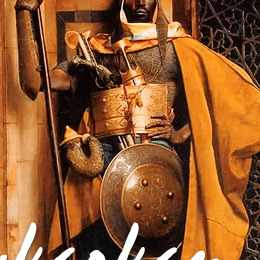
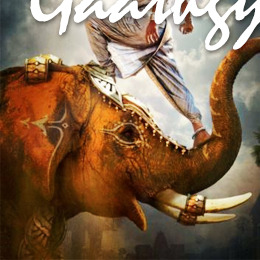
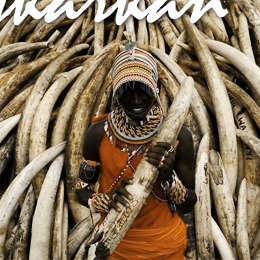
PALISOR REGIONS MOODBOARDS - [X] Gaathgykarkan
Gaathgykarkan was a low steppe-land situated north of the Shay Bight. Characterized by short, lushy grasses and gently rolling countryside, it was the southernmost plain among the vast array of flatlands stretching across central Endor. Its moderate climate and sheltered position provided inviting pasturage for its Aharin- (in the north) and Ibavin-speaking (in the south) residents, most of whom were herders.
The people of the Gaathgykarkan were known as the Gaathgykar. For more information, check this post.
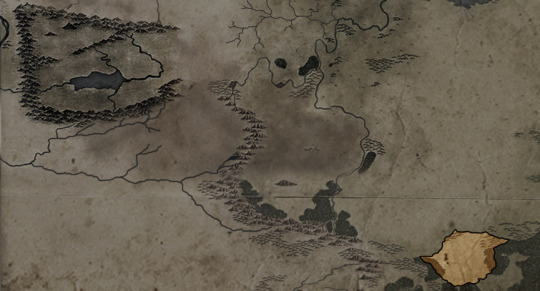
#my edits#tolkienedit#Palisor Regions Moodboards#Palisor#Gaathgykarkan#MERP#Rhun#Easterlings#Haradrim#Harad#Middle-Earth
36 notes
·
View notes
Photo

Tuvon
Tuvon is another of the Olóssi, and he dwelt of old in Palisor, nigh to Cuiviénen, and was the first of the Maiar to encounter Men in their awakening in Hildorien. He is described as the greatest wizard in Arda, and was a master of glamors and illusions. He shepherded a group of the Avari in the Days of the Stars, and he helped to combat the influence of Melkor over Men. His name means The Receiver, as he was the recipient of much of Irmo’s instruction in illusions and dreams. He is the patron of glamors and illusions, and all sorts of misdirecting magick.
2 notes
·
View notes
Quote
...and 'tis said that Dairon following after [Luthien] became utterly lost, and came never back to Elfinesse, but turned towards Palisor, and there plays subtle magic musics still, wistful and lonely in the woods and forests of the south.
This was really sad (From Beren and Luthien by JRR Tolkien)
4 notes
·
View notes